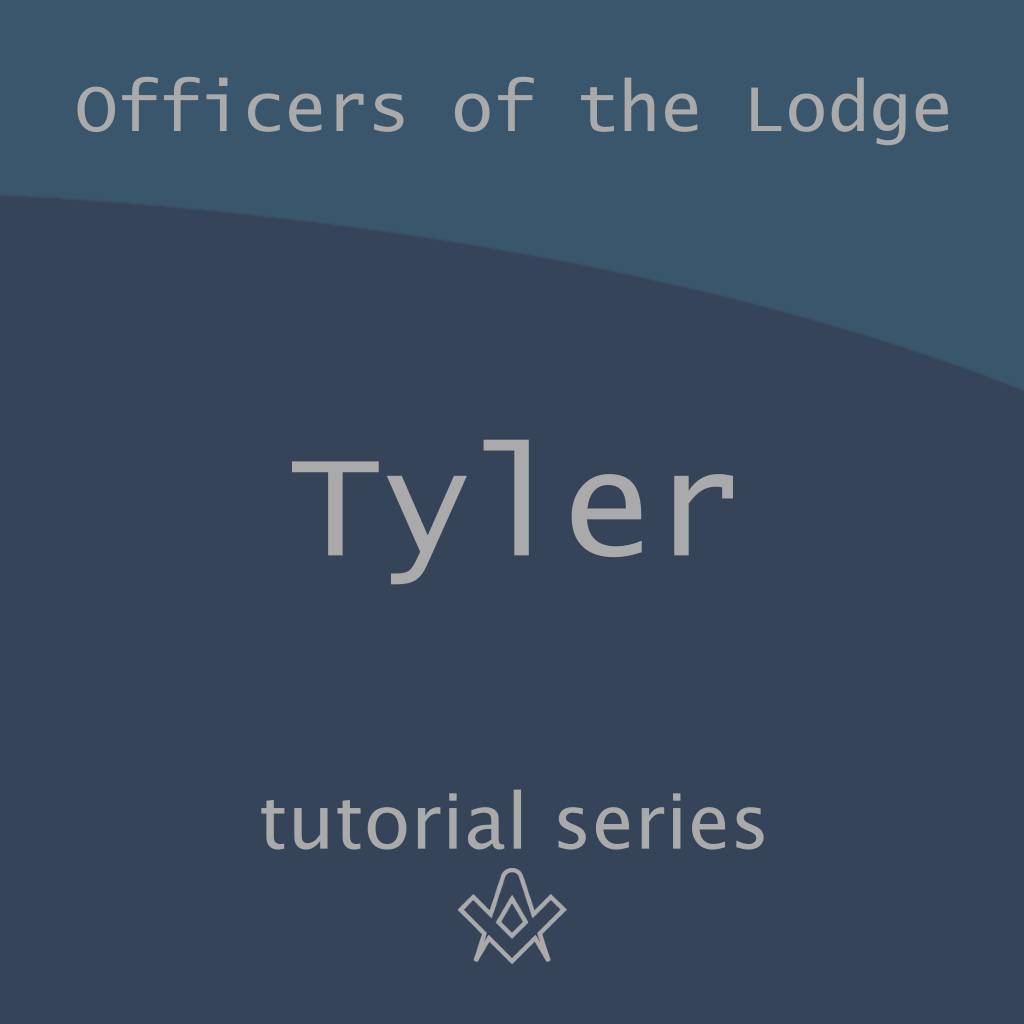Who is the Tyler being placed outside the door of the lodge, symbolically to protect our moral selves.
This is a 1 of 6 part tutorial series on the Officers of the Lodge
Each part published monthly in The Square
Lodge Officers: The Tyler, Inner Guard, Deacons, Junior Warden, Senior Warden, Worshipful Master
Video Presentation ( 15mins )
The Tyler – Blind Faith
Introduction
‘My attitude affects my behaviour which affects your attitude and your behaviour.’
This is called Betari’s Box and is a phrase that was drummed into me as a young police officer and a phrase I drummed into students of mine who saw their careers in the military or blue light services.
Why is that so important when we talk about the Tyler? Attitudes are formed, in the most part, by experiences pleasant or otherwise.
We only have one chance to make a first impression, a first experience.

The first formal experience a visitor or candidate has with our lodge is their interaction with the Tyler, the outer guard.
It is he who sets the tone of the lodge. So, the choice of selecting a Tyler is very important.
He is not only a guard to our secrets but also an ambassador of our character.
He must personify Freemasonry in that he must demonstrate justness and uprightness in his actions, be mature in his demeanour and judgement, and moral in his outlook.
He must confer all this in his behaviour towards members, candidates, and visitors alike.
A tall order one might say. But is it? It should be who we are.
Before we go more deeply into the role of the Tyler let us look at what he is guarding, the entrance to the lodge.
The lodge, according to W. L. Wilmshurst in his book, The Meaning of Masonry, represents man himself.
The Worshipful Master symbolically represents the man’s ‘spirit’; his qualities of purpose and meaning.
The Senior Warden symbolically represents man’s ‘soul’, the very essence of a person, his inward nature and true substance.
The Junior Warden symbolically represents man’s ‘mind’, the ability to think and reason,
The Senior Deacon links the ‘spirit’ and ‘soul’, his actions, whilst the Junior Deacon links the ‘soul’ to the ‘mind’, his decisions and choices his attitude.
The Inner Guard represents our inner senses, imagination, intuition, insight, inspiration, and instinct, whilst the outer guard our outer senses, sight, hearing, touch, taste, and smell.
This the how the lodge, man himself, is symbolically formed.
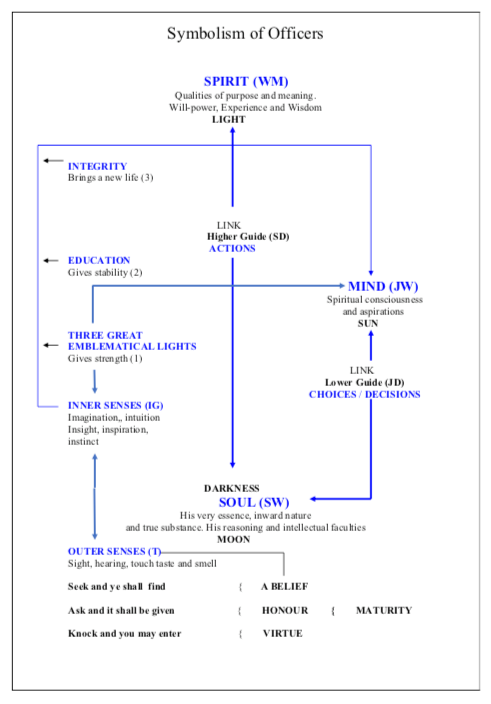
Reflection
The Tyler
Duty 1
Being placed outside the door of the lodge. Symbolically to protect our moral selves.
The Tyler represents our outer senses those of sight, hearing, touch, taste, and smell.
So, let us examine sight. What are we looking at in order to defend our moral integrity? The immediate danger to our integrity is that of stereotyping because of appearance.
Look into a person’s eyes for it is there that you will see a reflection of their soul.
Examine their body language for it is there that you will see their intention. Other external appearances are of no value.
In examining the sense of hearing you can tell the sincerity, honesty and value of words, whilst the sense of touch along with the sense of hearing will confirm the status of an individual; a Candidate, a Cowan, an intruder or a Brother.
Of course, the person who you are observing will also be observing you.
What signals and messages are you giving by your attitude and your behaviour?
Duty 2
See the candidates are properly prepared.
The ritual preparation process is pointless unless the symbolism behind the ritual is known.
What is in your mind when all your valuables are taken from you?
What is in your heart when your breast is exposed?
What value do you place on the moral contract you entered into when you were slipshod?
And how humble are you when your knee(s) was made bare?
Duty 3
To give the proper reports on the door of the lodge when Candidates, members, or visitors require admission.
(Knock 1) – Seek and ye shall find, the symbolic meaning of the first of the three knocks on the lodge door by the guard, our outer senses.
Seeking personal development and finding ‘a society of men who prize honour and virtue above the external advantages of rank and fortune’.
(Knock 2) – Ask and it shall be given, the symbolic meaning of the second knock. Having found a path which reflects your values, that all important question is asked, ‘How can I take that path? How do I become a Freemason?’
It is a question that can only be answered by someone who has taken that path before you – a Freemason.
(Knock 3) – Knock and you may enter, the symbolic meaning of the third knock.
Once that important question has been asked and your character determined you are guided to the door of the lodge and met by the Tyler who prepares you for your onward journey of ‘blind faith’.
‘Blind faith’ because you are trusting in your beliefs and trusting in your guides to lead you through to your inevitable destiny.
Duty 4
Being armed with a drawn sword to keep off all intruders and Cowans to Masonry and to suffer none to pass but such are duly qualified.
The sword represents the tongue of good report held by the fine thread of life.
The sword will continue to defend you for as long as the tongue remains of good report.
Action:
Reflect on what it means to you to be a Mason.
Conclusion:
Yesterday I was a good man. Today I will be a better man.
The Tyler is the guardian of our moral compass, our attitude and behaviour ensuring that we never drop below the moral standard expected of every Freemason.
You only have one chance to make a first impression.
Blind faith – by trusting in your beliefs and reflecting daily on your progress you will be a better man. A better Freemason.
Footnotes
References
The Meaning of Masonry W. L. Wilmshurst, 1920
Betari’s Box Theory. National Police Public Order Training Curriculum, Guidance for Trainers, 2016.
Lodge of Union No. (UGLE) 38 Ritual Book.
Article by: Stephen J. Goulding
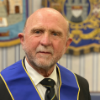
Stephen was initiated into Freemasonry in 1978 in Tylney Lodge No. 5856 (UGLE). He was Master in 1989 & 2004.
He was Master of the Lodge of Union 38 (UGLE) in 2018. He is also a PZ in the Holy Royal Arch and PM in the Mark Degree.
Stephen served 30 years in the Metropolitan Police Service (London, England) before going into education in 2000, where he became a college lecturer and a mentor for both the college and the University of Greenwich (London, England). Now retired, he teaches Tai Chi and Qigong in the community.
Facebook: Steve Goulding-Tai Chi West Sussex–Chi at Chi
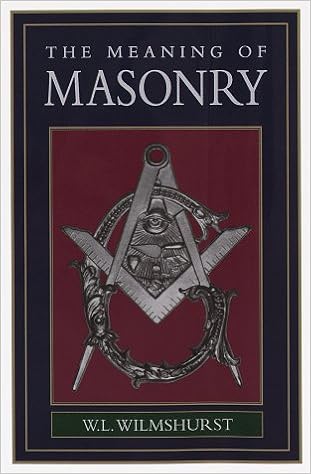
The Meaning of Masonry
By W.L. WILMSHURST
Although the Freemasons number over six million members worldwide, they are a very secretive organization. the general public today thinks of them as a social fraternity like the Rotary Club, but that is hardly the whole truth.
By mysterious coincidence, it seems, many Masons have been major figures in modern history. many of the Founding Fathers of the United States—including George Washington, Thomas Jefferson, Benjamin Franklin, and Paul Revere—were Freemasons.
Giuseppe Garibaldi, the Italian freedom fighter, was also one, as were the composers Franz Joseph Haydn and Wolfgang Amadeus Mozart and writers François Marie Arouet de Voltaire and Johann Wolfgang von Goethe.
The Meaning of Masonry explores the beliefs behind the order, its cryptic rites and symbols, and uncovers its ultimate purpose.
Recent Articles: officers of the lodge
 Tyler: The significance as the protector of the lodge's secrets and harmony. Tasked with guarding the entrance, the Tyler symbolizes our spiritual and moral boundaries, ensuring only worthy candidates are allowed into the sacred space of Freemasonry's teachings and rituals. |
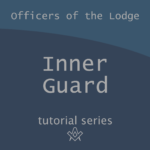 Officers of the Lodge - Inner Guard Inner Guard: Is the first line of defence against unworthy intruders, the Inner Guard represents our inner conscience and the personal responsibility we have to safeguard the integrity of our spiritual journey. |
 Officers of the Lodge - Deacons Deacons: The messengers and intermediaries within the lodge. Representing the communication between the material and the spiritual realms, Deacons symbolize the importance of transmitting knowledge and wisdom as we strive for personal growth and enlightenment on our Masonic journey. |
 Officers of the Lodge - Junior Warden Junior Warden: Ensuring the well-being of the brethren during the lodge's hours of refreshment. Representing the virtue of temperance, the Junior Warden reminds us to find balance in our lives and cultivate moral discipline in our pursuit of truth. |
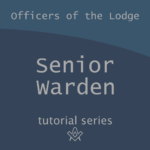 Officers of the Lodge - Senior Warden Senior Warden: embodies the essence of strength and stability within the lodge. As the pillar of support for the Worshipful Master, the Senior Warden symbolizes the fortitude required on our spiritual journey, inspiring us to persevere in the face of adversity |
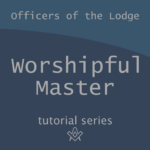 Officers of the Lodge - Worshipful Master Worshipful Master: the highest-ranking officer in the lodge, is the embodiment of wisdom and authority. The Worshipful Master guides the brethren on their spiritual path, representing the divine light that illuminates the Masonic quest for knowledge and self-discovery. |
masonic knowledge
to be a better citizen of the world
share the square with two brothers

click image to open email app on mobile device


